Recent PublicationsMedia presentations of climate changeby M.T. Boykoff and J. Smith |
Climate quarrels: ‘It’s not you, it’s me ... well it’s us’by M.T. Boykoff |
 |
Excerpt: In Why we disagree about climate change, Professor Mike Hulme concludes that (spoiler alert!) ‘the sources of our disagreement about climate change lie deep within us, in our values and in our sense of identity and purpose’ (p.364). He argues that, ‘our disagreements should, at best, always lead us to learn more about ourselves’ (p. 364). Thus, improving our considerations and understanding of these elements can help us collectively get to the root of our climate quarrels. (read more ...) |
Influence of location, population and climate on building damage and fatalities due to Australian bushfire: 1925-2009by R.P. Crompton, K. J. McAneney, K. Chen, R. A. Pielke Jr., and K. Haynes |
 |
Abstract: This study reevaluates the history of building damage and loss of life due to bushfire (wildfire) in Australia since 1925 in light of the 2009 Black Saturday fires in Victoria in which 173 people lost their lives and 2298 homes were destroyed along with many other structures. Historical records are normalized to estimate building damage and fatalities had events occurred under the societal conditions of 2008/09. There are relationships between normalized building damage and the El Nino–Southern Oscillation and Indian Ocean dipole phenomena, but there is no discernable evidence that the normalized data are being influenced by climatic change due to the emission of greenhouse gases. The 2009 Black Saturday fires rank second in terms of normalized fatalities and fourth in terms of normalized building damage. The public safety concern is that, of the 10 years with the highest normalized building damage, the 2008/09 bushfire season ranks third, behind the 1925/26 and 1938/39 seasons, in terms of the ratio of normalized fatalities to building damage. A feature of the building damage in the 2009 Black Saturday fires in some of the most affected towns—Marysville and Kinglake—is the large proportion of buildings destroyed either within bushland or at very small distances from it (10 m). Land use planning policies in bushfire-prone parts of this country that allow such development increase the risk that bushfires pose to the public and the built environment. (read more ...) |
Emergence timescales for detection of anthropogenic climate change in US tropical cyclone loss databy R.P. Crompton, R.A. Pielke Jr., and K.J. McAneney |
 |
Abstract: Recent reviews have concluded that efforts to date have yet to detect or attribute an anthropogenic climate change influence on Atlantic tropical cyclone (of at least tropical storm strength) behavior and concomitant damage. However, the possibility of identifying such influence in the future cannot be ruled out. Using projections of future tropical cyclone activity from a recent prominent study we estimate the time that it would take for anthropogenic signals to emerge in a time series of normalized US tropical cyclone losses. Depending on the global climate model(s) underpinning the projection, emergence timescales range between 120 and 550 years, reflecting a large uncertainty. It takes 260 years for an 18-model ensemble-based signal to emerge. Consequently, under the projections examined here, the detection or attribution of an anthropogenic signal in tropical cyclone loss data is extremely unlikely to occur over periods of several decades (and even longer). This caution extends more generally to global weather-related natural disaster losses. (read more ...) |
Economic impacts of tropical cyclonesby R.P. Crompton, S. Schmidt, L. Wu, R. Pielke, Jr., R. Musulin, and E. Michel-Kerjan |
 |
Excerpt: Global natural disaster losses have risen dramatically in recent decades and tropical cyclones have contributed significantly to this trend. Tropical cyclones account for nine of the ten most costly inflation-adjusted insurance natural disaster losses (2009 dollars) between 1970 and 2009 (Swiss Re, 2010). Of these nine, eight impacted the US and surrounding areas and one impacted Japan. In original loss values, tropical cyclones account for two of the five most costly economic losses and four of the five most costly insurance losses from natural disasters over the period 1950 to 2009 (Munich Re, 2010). All hurricanes in the top five of both original loss lists impacted the US and Hurricane Katrina tops the original and inflation adjusted loss lists. (read more ...) |
Creating usable science: Opportunities and constraints for climate knowledge use and their implications for science policyby L. Dilling and M.C. Lemos |
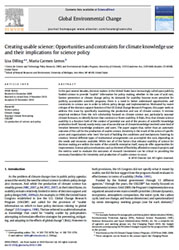 |
Abstract: In the past several decades, decision makers in the United States have increasingly called upon publicly funded science to provide “usable” information for policy making, whether in the case of acid rain, famine prevention or climate change policy. As demands for usability become more prevalent for publicly accountable scientific programs, there is a need to better understand opportunities and constraints to science use in order to inform policy design and implementation. Motivated by recent critique of the decision support function of the US Global Change Research Program, this paper seeks to address this issue by specifically examining the production and use of climate science. It reviews empirical evidence from the rich scholarship focused on climate science use, particularly seasonal climate forecasts, to identify factors that constrain or foster usability. It finds, first, that climate science usability is a function both of the context of potential use and of the process of scientific knowledge production itself. Second, nearly every case of successful use of climate knowledge involved some kind of iteration between knowledge producers and users. The paper argues that, rather than an automatic outcome of the call for the production of usable science, iterativity is the result of the action of specific actors and organizations who ‘own’ the task of building the conditions and mechanisms fostering its creation. Several different types of institutional arrangements can accomplish this task, depending on the needs and resources available. While not all of the factors that enhance usability of science for decision making are within the realm of the scientific enterprise itself, many do offer opportunities for improvement. Science policy mechanisms such as the level of flexibility afforded to research projects and the metrics used to evaluate the outcomes of research investment can be critical to providing the necessary foundation for iterativity and production of usable science to occur. (read more ...) |
A democracy paradox in studies of science and technologyby E. Lövbrand, R.A. Pielke, Jr., and S. Beck |
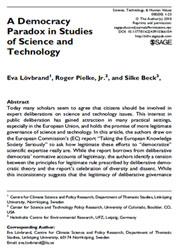 |
Abstract: Today many scholars seem to agree that citizens should be involved in expert deliberations on science and technology issues. This interest in public deliberation has gained attraction in many practical settings, especially in the European Union, and holds the promise of more legitimate governance of science and technology. In this article, the authors draw on the European Commission’s (EC) report “Taking the European Knowledge Society Seriously” to ask how legitimate these efforts to “democratize” scientific expertise really are. While the report borrows from deliberative democrats' normative accounts of legitimacy, the authors identify a tension between the principles for legitimate rule prescribed by deliberative democratic theory and the report’s celebration of diversity and dissent. While this inconsistency suggests that the legitimacy of deliberative governance arrangements is justified on empirical rather than normative grounds, it remains an open question whether studies of science and technology offer enough empirical support for such a justification. In this article, the authors address this pressing question and propose three possible responses. (read more ...) |
Climate denier, skeptic, or contrarian?by S.J. O’Neill and M.T. Boykoff |
Success is not guaranteedby R.A. Pielke, Jr. |
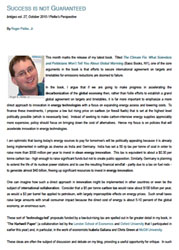 |
Excerpt:"Technology-led" proposals funded by a low-but-rising tax are spelled out in far greater detail in my book, in "The Hartwell Paper" (a collaboration led by the London School of Economics and Oxford University that I participated in earlier this year) and, in particular, in the work of economists Isabela Galiana and Chris Green at McGill University. These ideas are often the subject of discussion and debate on my blog, providing a useful opportunity for critique. In such discussions I have found an interesting objection to the proposals, which comes both from those who favor the conventional, top-down targets and timetables approach as well as from those who are opposed to efforts to intentionally seek to accelerate the decarbonization of the economy. (read more ...) |
The role of new media in engaging the public with climate changeby S.J. O’Neill and M. Boykoff |
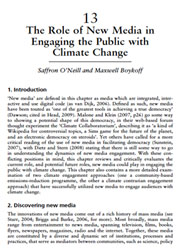 |
Excerpt:‘New media’ are defined in this chapter as media which are integrated, interactive and use digital code (as van Dijik 2006). Defined as such, new media have been touted as ‘one of the greatest tools in achieving a true democracy’ (Dawson, cited in Head, 2009). Malone and Klein (2007, p26) go some way to showing a potential shape of this democracy, in their web-based forum thought experiment the ‘Climate Collaboratorium’; describing it as ‘a kind of Wikipedia for controversial topics, a Sims game for the future of the planet, and an electronic democracy on steroids’. Yet others have called for a more critical reading of the use of new media in facilitating democracy (Sunstein, 2007); with Dietz and Stern (2008) stating that there is still some way to go in understanding the dynamics of new media engagement. With these conflicting positions in mind, this chapter reviews and critically evaluates the current role, and potential future roles, new media could play in engaging the public with climate change. This chapter also contains a more detailed examination of two climate engagement approaches (one a community-based emissions-reduction programme, the other a climate contrarian engagement approach) that have successfully utilised new media to engage audiences with climate change. (read more ...) |
A positive path for meeting The global climate challengeby R.A. Pielke, Jr. |
Beyond the annual climate confabby R.A. Pielke, Jr. |
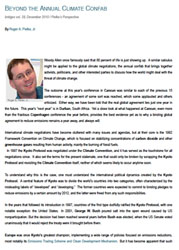 |
Excerpt: Woody Allen once famously said that 80 percent of life is just showing up. A similar calculus might be applied to the global climate negotiations, the annual confab that brings together activists, politicians, and other interested parties to discuss how the world might deal with the threat of climate change… (read more ...) |
Effective media reporting of sea level rise projections: 1989–2009by U.K. Rick, M.T. Boykoff, and R.A. Pielke, Jr. Environmental Research Letters Vol. 6, No. 1 (2011) |
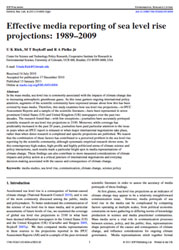 |
Abstract: In the mass media, sea level rise is commonly associated with the impacts of climate change due to increasing atmospheric greenhouse gases. As this issue garners ongoing international policy attention, segments of the scientific community have expressed unease about how this has been covered by mass media. Therefore, this study examines how sea level rise projections—in IPCC Assessment Reports and a sample of the scientific literature—have been represented in seven prominent United States (US) and United Kingdom (UK) newspapers over the past two decades. The research found that—with few exceptions—journalists have accurately portrayed scientific research on sea level rise projections to 2100. Moreover, while coverage has predictably increased in the past 20 years, journalists have paid particular attention to the issue in years when an IPCC report is released or when major international negotiations take place, rather than when direct research is completed and specific projections are published. We reason that the combination of these factors has contributed to a perceived problem in the sea level rise reporting by the scientific community, although systematic empirical research shows none. In this contemporary high-stakes, high-profile and highly politicized arena of climate science and policy interactions, such results mark a particular bright spot in media representations of climate change. These findings can also contribute to more measured considerations of climate impacts and policy action at a critical juncture of international negotiations and everyday decision-making associated with the causes and consequences of climate change. (read more ...) |
Regional climate serviceby H. von Storch, I. Meinke, N. Stehr, B. Ratter, W. Krauss, R. A. Pielke, Jr., R. Grundmann, M. Reckermann, and R. Weisse |
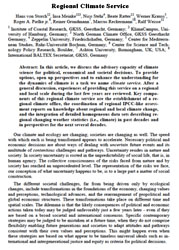 |
Abstract: In this article, we discuss the advisory capacity of climate science for political, economical and societal decisions. To provide options, open up perspectives and to enhance the understanding for the dynamics of climate is a task we name climate service. After a general discussion, experiences of providing this service on a regional and local scale during the last few years are reviewed. Key components of this regional climate service are the establishment of a regional climate office, the coordination of regional IPCC-like assessment reports on knowledge about regional and local climate change, and the integration of detailed homogeneous data sets describing regional changing weather statistics (i.e., climate) in past decades and in perspectives for the next several decades. (read more ...) |

